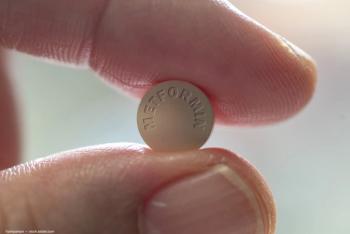
Ocular Therapeutix closes enrollment in phase 3 SOL-R clinical trial for wet AMD
The trial will evaluate AXPAXLI in at least 555 patients in a multi-center, double-masked, randomized (2:2:1), 3-arm study.
Ocular Therapeutix has closed enrollment in its SOL-R registrational trial of its product candidate AXPAXLI (also known as OTX-TKI) in
AXPAXLI is an investigational, bioresorbable, intravitreal hydrogel incorporating axitinib, a small-molecule, multi-target tyrosine kinase inhibitor (TKI) with anti-angiogenic properties. It is being evaluated for the treatment of
The company noted1 that it believes it has enrolled enough patients to ensure the target randomization of at least 555 patients in SOL-R. Patients are enrolled across approximately 100 sites in the US, Argentina, India, and Australia. The trial is a multi-center, double-masked, randomized (2:2:1), 3-arm study. Patients enrolled are either treatment-naïve or were newly diagnosed with wet AMD in the study eye no longer than about 4 months prior to enrollment.
SOL-R will be evaluating the safety and efficacy of AXPAXLI dosed every 6 months versus aflibercept (2 mg) every 8 weeks. Patients that have been screened and enrolled are now being treated with standard-of-care anti-VEGF treatment, excluding brolucizumab-dbll, and evaluated during a loading phase. Patients with significant retinal fluid fluctuations will be excluded.
The primary endpoint of SOL-R is to demonstrate non-inferiority in the mean change in best corrected visual acuity (BCVA) from baseline between the AXPAXLI and on-label aflibercept (2 mg) arms at week 56.
During a run-in period, patients will receive 2 loading doses of aflibercept (2 mg) prior to day 1. Patients in the first arm will receive a single dose of AXPAXLI at day 1 and are re-dosed at weeks 24, 48, and 72. Patients in the second arm will receive aflibercept (2 mg) on-label every 8 weeks. While patients in the third arm will receive a single dose of aflibercept (8 mg) at day 1 and are re-dosed at weeks 24, 48, and 72, aligned with the AXPAXLI treatment arm for adequate masking.
Throughout the study, patients will be monitored monthly and will be followed for safety and masked until the end of year 2. Rescue criteria is a loss of ≥ 10 Early Treatment Diabetic Retinopathy Study (ETDRS) letters of BCVA from baseline or a combination of worsening anatomical measures and BCVA loss.
Pravin U Dugel, MD, executive chairman, president, and CEO of Ocular Therapeutix, commented on the trial enrollment in a press release from the company.1
“Completing enrollment in SOL-R—the largest retinal TKI trial to date—one year after the study was conceptualized reflects an extraordinary pace of execution and underscores our commitment to advancing innovation for patients with wet AMD,” said Dugel “Together with SOL-1, these two complementary, FDA-aligned registrational trials have the potential to form a robust clinical foundation to support an AXPAXLI label with a distinct superiority claim and unprecedented 6- to 12-month dosing. With recruitment ending, we are focused on disciplined trial execution, and we are encouraged by the remarkable retention and adherence to protocol we’ve observed to date in both SOL-1 and SOL-R.”
In a Type C response and a subsequent written response, the FDA said that together, the trials SOL-1 and SOL-R could support a potential New Drug Application (NDA) and label for AXPAXLI in wet AMD. The trials were designed in alignment with FDA guidance and validated through a Special Protocol Assessment (SPA) agreement for SOL-1 and written responses for SOL-R received in 2024.
SOL-1 is evaluating the safety and efficacy of AXPAXLI in a multi-center, double-masked, randomized (1:1) parallel group study. The
The company noted that the trials were designed as complementary trials to provide a comprehensive evaluation of AXPAXLI while strictly adhering to FDA guidance. Neither trial uses sham injections, mitigating the potential for bias from inadequate masking, according to the company.
Ocular Therapeutix plans to submit an NDA for FDA review following 56-week data from SOL-R and potential positive results from SOL-1 and SOL-R.
References:
Ocular Therapeutix™ To close enrollment this week for SOL-R, its second registrational trial evaluating AXPAXLI™ in wet age-related macular degeneration. Published May 28, 2025. Accessed June 2, 2025.
https://investors.ocutx.com/news-releases/news-release-details/ocular-therapeutixtm-close-enrollment-week-sol-r-its-second Crago SM. Over 300 patients randomized in Ocular Therapeutix's SOL-1 phase 3 trial for OTX-TKI. Published December 4, 2024. Accessed June 2, 2025.
https://www.ophthalmologytimes.com/view/over-300-patients-randomized-in-ocular-therapeutix-sol-1-phase-3-trial-for-otx-tki Harp MD. Ocular Therapeutix enrolls first patient in phase 3 SOL-R clinical trial for wet AMD. Published July 30, 2024. Accessed June 2, 2025.
https://www.ophthalmologytimes.com/view/ocular-therapeutix-enrolls-first-patient-in-phase-3-sol-r-clinical-trial-for-wet-amd
Newsletter
Keep your retina practice on the forefront—subscribe for expert analysis and emerging trends in retinal disease management.




























